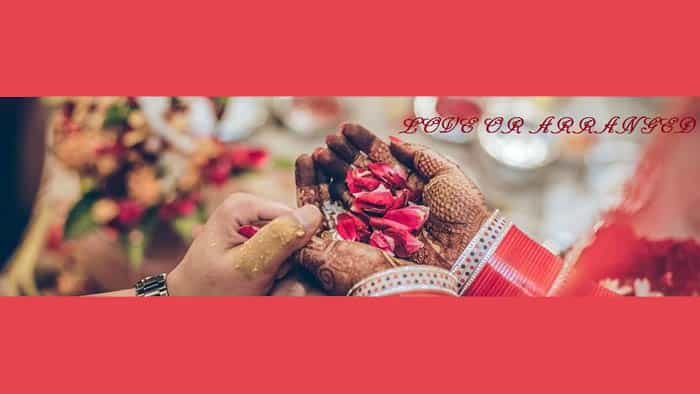Love vs. Arranged Marriage

“Love may be blind, but marriage is a real eye-opener.”
Whenever we talk about Indian weddings we try to equate them with arranged marriages. In India, the social structure is such that we associate Indian marriages mainly with arranged marriages. Most of us have the feeling that arranged marriage is the concept of Indian society. But history tells us that arranged marriages use to happen even in the Victorian age. The history of England tells us that most of the kings and queens had arranged marriages. In India arranged marriages originated when child marriages were customary in the country. The caste system gave birth to arrange marriages, as the upper caste families didn’t want their children to marry outside their community and caste. The concept of love marriage was taboo in ancient India as India always had a tradition of arranged marriages. But after World War II and the industrial revolution people’s perceptions started changing and they became familiar with the concept of love marriages.
In India, the influence of British culture gave rise to love marriages. The idea, which was once a taboo, became more open and acceptable in Indian society. But this change was seen only among the educated and high society Indians. The rural parts of the country remained ignorant and unaware of love marriages. In spite of the social changes arranged marriage persisted.
Love or arranged marriages are still a debatable topic in Indian society. People still debate on the issue, which one is better. What should be the basis of marriage love or social norms? We are still confused about these issues. Education and the media played a vital role in changing the perception of the Indian mind. As people started thinking beyond the social customs and traditions of arranged marriages. They realized that they have the right to choose their life partner without any kind of social pressure. It is after all their life. They can decide without having to rely on parents, relatives, and matchmakers. This change in the mental setup of the people gave birth to love marriages.
Now in India people are open to love marriages. It is no more forbidden in society. In our country, we are having both love and arranged marriages. If we start comparing love and arranged marriages we will see that both have certain pros and cons. But the common factor in both the concept is physical attraction. When a man and a woman go out on their first date physical attraction is the deciding factor. Same in the case of arranged marriage where the relation starts only after the girl or boy likes each other.
But there are certain things, which are found in love marriages and not arranged. Like spending time together and getting to know each other. Because when you have decided to spend life together it is important you know the person. There should be metal compatibility and understanding among both of you. And this happens when you spend time together. This person may argue that even after knowing each other for so long then why people get divorced after marriage. It is because when two people are in love they are at their best to impress each other. They behave, they talk and they wear what the other person likes. But it is after a marriage that you get to know the real person. There are couples who are still discovering each other even after twenty years of their marriage. This is the actual beauty of a relationship where every day you discover a new thing about your partner.
In the case of arranged marriages, the relation starts when the girl and the boy get to know each other in a couple of meeting before the final commitment. Before deciding anything the parents check the family background and financial stability. Which is also very important. Most people have an idea that those who go for arranged marriages are not in an advantageous position but it’s not so you may get the right person for whom you have been waiting.
Even in love marriages after many years of courtship people find their partner not suitable and they break up. So it is not about spending time together but a successful marriage is all about understanding and respecting each other’s feelings, love, and concern. It is argued that love marriages offer more independence and freedom, as compared to arranged marriages since both of them, know each other so the social pressure and family pressure are less. If you know somebody before marriage it allows partners to have better respect and understanding for each other’s needs and desires. In love marriages, expectations are more compared to arrange marriages, as they know each other and want their partner to act in the best possible manner.
Suggested Read: Marriage Culture in India
Arranged marriages offer more protection, security to women. As the parents decide the family. Parents make use of maturity and wise decision while choosing suitable spouses for their children. The mature decision of parents sometimes helps to make the right choice. But it doesn’t mean that arranged marriages are ideal marriages. Even in an arranged marriage, there is a different sort of social pressure. Social evils like dowry, caste system, matching of horoscopes, and community issues are taken at such extreme levels that people don’t support arranged marriages.
So whether it is love or arranged ultimately it is up to the individual to decide, which one to go for. Love or arranged both is based on empathy, responsibility, commitment, love, and concern. So it’s not just about initial love and attraction it needs a lot of dedication and effort to sustain a marriage. So there is nothing like an ideal marriage it’s all about the way you perceive your marriage. After all, you should be happy with your life partner irrespective of love or arranged marriage.
